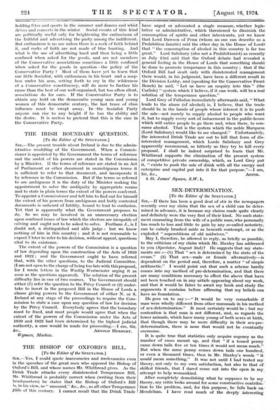THE IRISH BOUNDARY QUESTION.
[To the Editor of the SPECTATOR.]
Six,—The present trouble about Ireland is due to the admin- istrative muddling of the Government. When a Commis- sioner is appointed by the Government the terms of reference and the ambit of his powers are stated in the Commission by a Minister. If the terms of reference are stated in an Act of Parliament or other document in unambiguous terms it is sufficient to refer to that document, and incorporate it by reference in the Commission. But if the terms so referred to are ambiguous it is the duty of the Minister making the appointment to solve the ambiguity by appropriate means and to state in plain terms the extent of the powers conferred. To appoint a Commissioner and tell him to find out for himsel1. the extent of his powers from ambiguous and hotly contested documents is unheard of futility, bound to lead to confusion. Yet that is apparently what the Government proposes to do. So we may be involved in an unnecessary election upon confused issues of law which the electors are incapable of eolving and ought not to be asked to solve. Feetham J., is I doubt not, a distinguished and able judge : but we know nothing of him in this country : and• it is not reasonable to expect Ulster to refer to his decision, without appeal, questions vital to its existence.
The extent of the powers of the Commission is a question of law depending upon the construction of the Acts of 1920 and 1922; and the Government ought to have referred that, with the other questions, to the Judicial Committee. (I am not open to the charge of being too late with this proposal, for I wrote letters in the Weekly 'Westminster urging it as soon as the questions appeared). The solution of the present difficulty lies in one of two courses. The Government should either (1) refer the question to the Privy Council or (2) under- take to insert in the proposed Bill in the House of Lords a clause giving powers to the Government of either N. or S. Ireland at any stage of the proceedings to require the Com- mission to state a case upon any question of law for decision by the Privy Council. Everybody agrees that the boundary must be fixed, and most people would agree that when the extent of the powers of the Commission under the Acts of 1920 and 1922 had been determined by the highest judicial authority, a case would be made for proceeding.—I am, Sir, ARNOLD HERBERT.
Wymers, Marknv.


































 Previous page
Previous page